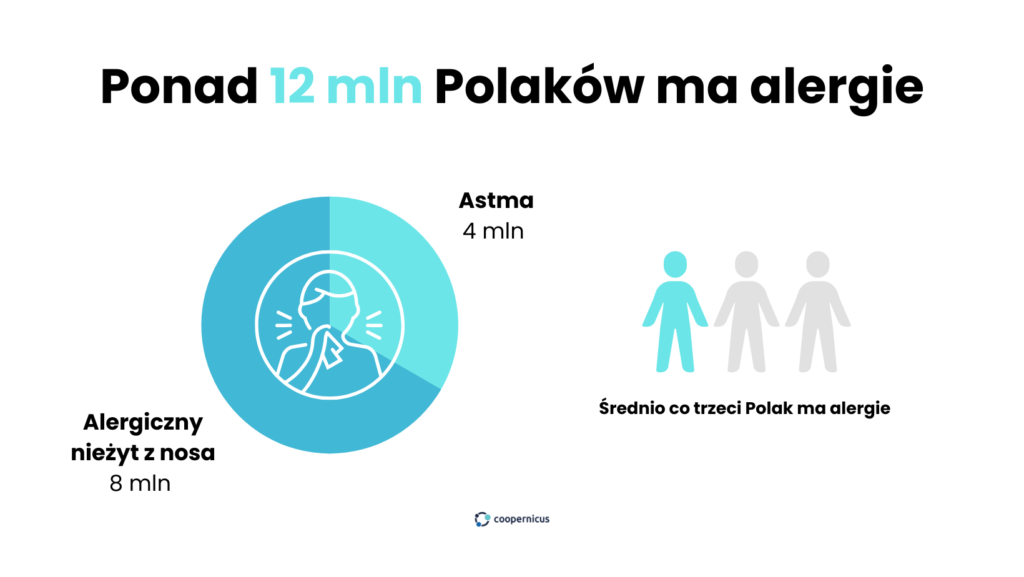According to the National Health Fund (NFZ), approximately 12 million Poles suffer from allergies [1]. Approximately 8 million have allergic rhinitis, while around 4 million struggle with asthma [1]. Allergy is a range of different conditions that can cause, for example, atopic dermatitis, rhinitis, diarrhea or attack the respiratory system with asthma symptoms [1]. However, the most life-threatening effect of allergy is systemic anaphylactic shock. So why do some people suffer from allergies while others do not? Allergens – various extrinsic antigens – are the cause of allergy symptoms.

Food antigens such as nuts or gluten-containing cereals are a great example of the most popular allergens that affect modern society. The top ten allergens also include pollen, house dust mites or fungal spores. The secret of allergy lies in environmental factors. These are the reasons why some human organisms overreact to substances that are neutral to our health, such as allergens. This triggers a series of immune reactions in the allergic body, which manifests itself in rhinitis, coughing and sneezing, for example. Allergies can affect susceptible people anywhere, but recent epidemiological data have shown that in cities there are more people with inhalation allergy, or pollen allergy, which is a reaction to natural pollen [2]. This is a very interesting observation, as cities tend to have less greenery than other areas, suggesting that allergy sufferers should find it much easier to function there during the pollen season. Polish researchers from the Jagiellonian University Collegium Medicum (UJ CM), the Pedagogical University of Krakow and the Institute of Plant Physiology of the Polish Academy of Sciences decided to investigate why this is so [3,4].
Allergy in cities
Many experimental studies have already shown that the reason for this interesting observation may be air pollution in cities, which affects the reactivity of natural pollen allergens. A team of Polish scientists tackled this problem in Krakow, where air pollution is quite severe. The researchers decided to measure pollen concentrations and study the pollen itself as well as birch trees growing under natural conditions [2]. The allergenicity of birch pollen was measured, of which the most allergenic protein is Betv1 [2]. This protein is responsible for most allergies in pollen-sensitised people in Central Europe [2]. Pollen is used by plants to reproduce and the periods when particular plants are pollenised are the times when allergy sufferers suffer the most.
Impact of pollution on urban vegetation
A Polish team of scientists is continuing a study already started in 2016, during which they studied birch trees of the Betula pendula species at 20 sites, including 10 in Krakow and 10 in suburban areas [3]. The results of the study showed higher allergen concentrations in the Krakow sites (especially in sites exposed to environmental pollution) than in birches outside the city [3]. However, the researchers did not find sufficient evidence to conclude that birch trees in cities became more ‘virulent’ due to air pollution.
Interestingly, instead, higher concentrations of plant stress proteins have been observed in urban birch trees, which may be the result of a response to stressors such as pollution found in cities. This is a vicious circle, as pollution affects the secretion of defence proteins and, with them, allergens, so that more people may react with sensitisation to birch in urban environments [3]. Research by Dr Iwona Stawoska (first author of recent studies on allergens in urban birch pollen) and her research team from the Pedagogical University of Krakow, Jagiellonian University and the Institute of Plant Physiology of the Polish Academy of Sciences took into account the secondary structure of proteins, where differences in allergens between birch trees from urban and non-urban areas were also observed [4]. Researchers still plan to carry out studies to deduce why higher allergen concentrations in birch pollen are so prominent in cities. This is important because the increased allergenicity of pollen significantly affects symptoms in people with inhalant allergies, which should undoubtedly be taken into account during therapy [3].
An increasingly popular method of allergy management is allergen immunotherapy, currently reimbursed by the National Health Fund (NFZ) on the Polish market. This method is used for patients with IgE-dependent allergies over the age of 6, who also meet the relevant criteria. Allergic patients living in cities should undoubtedly consider this type of treatment to induce their immunological tolerance.
References:
- National Health Fund (NFZ). Allergy and asthma – educational movies. [Internet] 2019. Available from: https://www.nfz.gov.pl/aktualnosci/aktualnosci-centrali/alergia-i-astma-filmy-edukacyjne,7363.html
- Stelmach M. Polish scientists answered the question, why trees growing in cities are producing more allergens. [Internet] 2023. Available from: https://www.termedia.pl/pulmonologia/Polscy-naukowcy-odpowiedzieli-na-pytanie-dlaczego-drzewa-w-miastach-produkuja-wiecej-alergenow,50293.html
- Myszkowska D, Piotrowicz K, Ziemianin M, Bastl M, Berger U, Dahl A, et al. Unusually high birch (Betula spp.) pollen concentrations in Poland in 2016 related to long-range transport (LRT) and the regional pollen occurrence. Aerobiology 37, 543–559 (2021). Available from: https://doi.org/10.1007/s10453-021-09703-w
- Stawoska I, Myszkowska D, Oliwa J, Skoczowski A, Wesełucha-Birczyńska A, Saja-Garbarz D, et al. Air pollution in the places of Betula pendula growth and development changes the physicochemical properties and the main allergen content of its pollen. PLoS ONE 18(1): e0279826. Available from: https://doi.org/10.1371/journal.pone.0279826
Wiktoria Bulik


